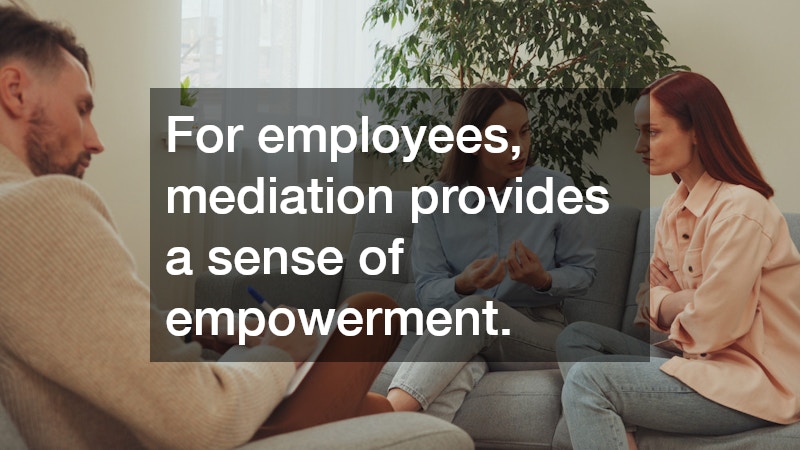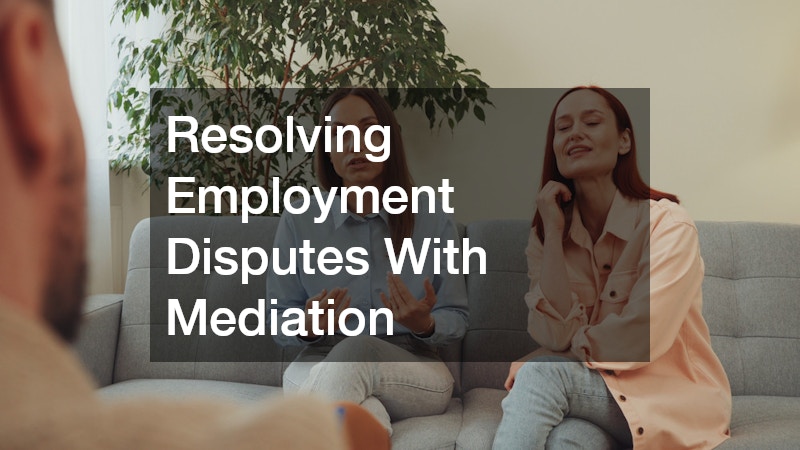
Employment disputes are an inevitable part of the modern workplace. Differences in opinion, misunderstandings, and conflicts over policies can escalate quickly if left unchecked. While traditional litigation is an option, it is often time-consuming, expensive, and stressful for both employers and employees. Mediation offers a more effective and amicable approach to resolving conflicts while preserving working relationships. By fostering open communication and mutual understanding, mediation can prevent disputes from damaging workplace morale or productivity.
Moreover, mediation encourages both parties to actively participate in finding solutions, which can lead to more creative and mutually beneficial outcomes. Unlike formal legal processes, mediation allows for flexibility in scheduling, confidentiality, and tailored approaches that address the unique circumstances of each workplace conflict. Adopting mediation early can also signal a company’s commitment to fairness and respect, helping to build trust among employees and reduce the likelihood of future disputes.
Understanding Mediation in the Workplace
Mediation is a structured process where a neutral third party, known as a mediator, facilitates discussion between disputing parties. Unlike a judge or arbitrator, the mediator does not impose a solution. Instead, they help both sides identify their interests, clarify misunderstandings, and reach a mutually acceptable agreement. This process encourages collaboration, reduces hostility, and allows both employees and employers to have a voice in resolving the issue.
In employment contexts, mediation can cover a wide range of conflicts. These may include disputes over promotions, salary disagreements, allegations of harassment or discrimination, miscommunication regarding job responsibilities, or conflicts between team members. By addressing these issues early through mediation, companies can avoid lengthy legal battles that disrupt the workplace and damage reputations.
Why Choose Mediation for Employment Disputes
A mediation master solution to employment disputes provides a professional, efficient, and confidential avenue for resolving workplace conflicts. Unlike informal discussions or internal complaint procedures, this approach is guided by experienced mediators who understand the complexities of employment law and organizational dynamics. Their expertise allows them to steer conversations productively, ensuring that discussions remain focused on solutions rather than blame.
Additionally, a mediation master solution to employment disputes offers flexibility. Sessions can be scheduled at convenient times, conducted in person or virtually, and tailored to the specific needs of the organization. This adaptability makes it easier for companies of all sizes to integrate mediation into their conflict-resolution strategy, fostering a culture where disputes are addressed constructively rather than suppressed.
Benefits for Employers and Employees
The advantages of using mediation to resolve employment disputes extend to both sides. For employers, mediation can significantly reduce the costs and risks associated with lawsuits. It also helps maintain workplace harmony by resolving conflicts discreetly and promptly. Employees benefit from a fair and impartial process that values their perspective and encourages them to participate actively in shaping the outcome.
Mediation also promotes long-term solutions. Agreements reached through mediation are typically more sustainable because both parties have invested in creating them. This contrasts with court-imposed decisions, which may leave one party dissatisfied and potentially lead to recurring conflicts. By resolving disputes collaboratively, mediation can strengthen professional relationships and improve overall workplace morale.
Steps in the Mediation Process
The mediation process generally follows a structured sequence. It begins with an initial assessment, where the mediator meets with each party individually to understand the core issues and gather background information. Next, a joint session allows both sides to present their perspectives and discuss the conflict openly. Through guided dialogue, the mediator helps the parties identify common ground and explore possible solutions.
Once potential resolutions are discussed, the mediator facilitates negotiations to create a mutually agreeable plan of action. This agreement is often documented formally and can include steps for follow-up or monitoring compliance. The process emphasizes confidentiality, voluntary participation, and the goal of achieving a solution that satisfies all parties involved.
Real-World Applications
Many organizations have successfully implemented mediation as a standard practice for handling disputes. Companies report reduced absenteeism, improved employee engagement, and lower turnover rates when conflicts are addressed promptly and fairly. Mediation is also useful in unionized workplaces, where it can prevent labor disputes from escalating into strikes or legal battles.
For employees, mediation provides a sense of empowerment. Rather than feeling sidelined in formal procedures, they actively contribute to finding a resolution. This collaborative approach can also improve communication skills, build trust, and create a more supportive workplace culture over time.
Employment disputes, if left unresolved, can have serious consequences for both employers and employees. Mediation offers an effective, confidential, and cost-efficient alternative to traditional litigation. By using a mediation master solution to employment disputes, organizations can address conflicts constructively, preserve professional relationships, and promote a positive work environment.
With the right approach, mediation not only resolves immediate disagreements but also strengthens long-term communication and cooperation. Organizations that embrace this method are better equipped to maintain harmony, enhance productivity, and ensure that all employees feel heard and valued. Choosing mediation demonstrates a commitment to fairness, collaboration, and sustainable conflict resolution in the workplace.

